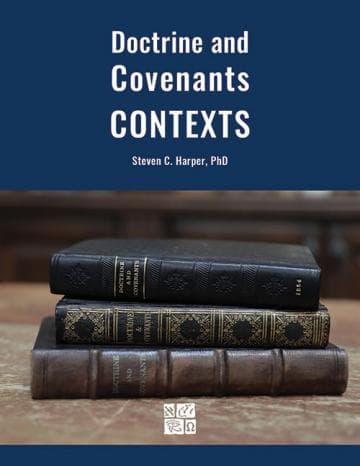Book
136 Chapters

Joseph purposely veiled the meaning of section 78. The issue it addresses is intentionally vague in the present form of the revelation. That is because it deals with Church finances and assets. It addresses the problem of paying for the things the Lord has commanded, namely the building of Zion and publishing the Book of Commandments. Joseph—whose job in the Literary Firm was to oversee expensive publication of the Book of Commandments (see section 70)—sat in counsel with Bishop Whitney, whose job it was to meet the Church’s needs from the storehouse, which was literally his store.
Where today’s verse 3 vaguely speaks about “an organization of my people,” the manuscript versions more specifically refer to “an organization of the literary and mercantile establishments of my church.”[1] Joseph kept the issues behind section 78 as confidential as possible to avoid giving the Church’s enemies information they could use to cripple it financially and thus undermine Zion. Essentially, the revelation tells how the Church could use its profitable mercantile assets (like Bishop Whitney’s store) to finance its revealed priorities (buying land in Missouri and publishing the scriptures).
Joseph and the other members of the Literary Firm had covenanted to publish the Book of Commandments, but they lacked funding for the expensive project. The Lord commanded Bishop Partridge to buy land, lots of it, on which to build Zion in Missouri. Bishop Whitney had a profitable store and other businesses in Ohio. Based on the law of consecration’s principle of using the surplus of some to meet the needs of others, section 78 provides a solution to these problems.
In obedience to the revelation, Joseph, Bishop Whitney, and Sidney Rigdon traveled to Missouri to counsel with Bishop Partridge and the Literary Firm, members who were there printing the Book of Commandments. Together they created the United Firm, which is often called the United Order, which is not the law of consecration. The United Firm (Order) was a corporation designed to support the Church according to the law of consecration. Technically, it was the joining of the Literary Firm with Newel Whitney’s Kirtland, Ohio, store and the Independence, Missouri, store operated by Whitney’s partner, Sidney Gilbert. Uniting these firms was meant to streamline the building of Zion. It did not ultimately work as intended. That is not God’s fault; it is the fault of free agents (see section 104). It worked great when Saints chose to keep their covenants and were not overwhelmed by their enemies.
[1] “Revelation, 1 March 1832 [D&C 78],” p. [1], The Joseph Smith Papers, accessed October 7, 2020; “Revelation Book 1,” p. 145, The Joseph Smith Papers, accessed October 7, 2020.
Book
136 Chapters
Items in the BMC Archive are made publicly available for non-commercial, private use. Inclusion within the BMC Archive does not imply endorsement. Items do not represent the official views of The Church of Jesus Christ of Latter-day Saints or of Book of Mormon Central.